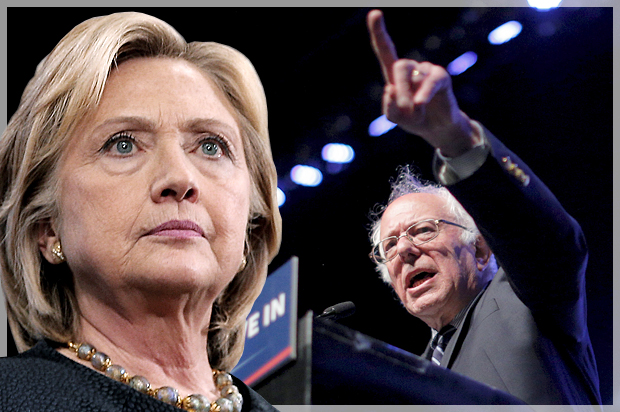 Anybody paying attention to the 2016 Democratic presidential campaign knows Bernie Sanders is on a roll. Hillary Clinton is doing everything she can to ignore him in her speeches. Her campaign is saying maybe they won’t debate before New York’s primary. But they keep sending email blasts saying how much more his grassroots supporters are donating than hers.
Anybody paying attention to the 2016 Democratic presidential campaign knows Bernie Sanders is on a roll. Hillary Clinton is doing everything she can to ignore him in her speeches. Her campaign is saying maybe they won’t debate before New York’s primary. But they keep sending email blasts saying how much more his grassroots supporters are donating than hers.
Sanders is leading Clinton by four points in the latest poll in the next big state, Wisconsin, which votes next Tuesday. Should he win, as even the New York Times was predicting earlier this week, then the race moves next to a series of delegate-rich mid-Atlantic states voting in late April: New York, Connecticut, Delaware, Maryland and Pennsylvania. (Rhode Island also votes on April 26.)
Most mainstream analysts are focusing on the delegate math, saying Sanders has to win at least 56 percent of the pledged delegates from all remaining states. They’re saying that math favors Clinton, because she does better among wealthier Democrats and more racially diverse states, and that’s who will be voting on April 19 (New York) and a week later along the eastern seaboard.
Indeed, those states are among those at the top of the national chart for highest household incomes, from just over $70,000 in Maryland to over just $50,000 in Pennsylvania in 2015. These states’ residents also tend to have the most disposable income, and people whose income brackets tend to invest their savings in stock market mutual funds.
These political projections and economic trends pose a fundamental question that is not being raised in most analyses: Will this region’s middle- and upper-middle-class Democrats respond to Sanders’ message that big steps need to be taken to offset class-based inequalities, starting with addressing economic injustices by making Wall Street pay higher taxes? Or will they reject him because they are financially doing better than the nation as a whole?
In other words, are Democrats who have figured out how to make more money willing to shake up the status quo?
It is one thing for Sanders to rail against the super-rich or target the wealthiest Americans for higher taxes. For example, his proposal to boost Social Security benefits by forcing people making more than $250,000 a year to pay income taxes for the program like those now making under $118,500—the current income tax cap funding the system—starts by targeting the wealthiest 1.5 percent of Americans. (If he proposed just lifting the current income tax cap, that would affect the top 6.3 percent of taxpayers.)
You can expect Sanders will not change his rhetoric that much, as that has been his hallmark. Reporters who have traveled with him have noticed that he only slightly modulates his topics as the audience changes, such as talking more about criminal justice reform when speaking to African Americans in the South.
But whether Sanders’ anti-establishment remedies will be rejected by Democrats who have more invested in the establishment— whether they are little more than continuing what Franklin Delano Roosevelt and Lyndon Johnson proposed decades ago—is a question where the answer will echo far beyond the Democrats’ 2016 nominating process.
Progressives can hope that the Democratic Party is changing; that after years of seeing it cater to pro-corporate centrists and the agendas of wealthier donors it is shifting back to Main Street. But in states along the Acela corridor, where Amtrak runs its fast trains between Washington and Boston, we will soon see if the resistance to systemic change is not just confined to the wealthiest Americans.
Will these Democrats be willing to see their mutual funds pay a tiny transaction tax if it is used for making public colleges and universities tuition-free, and lowering college loan interest rates? Will they be willing to pay more taxes if it means creating the national health-care program Sanders says will cost them $500 more a year yet cut annual coverage costs by thousands?
States with wealthier Democrats should have little to fear from a Sanders presidency. But as wealthier individuals are arguably more invested in the status quo, we’ll soon see whether eastern Democrats will embrace Sanders—and a broader progressive agenda.

